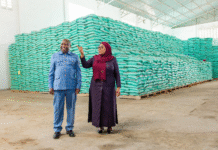The Food and Agriculture Organization of the United Nations (FAO) has called for increased investment in agrifood systems is essential to address the climate crisis at the 2024 UN Climate Change Conference (COP29) in Baku, Azerbaijan.
Over the two weeks of the international meeting and through events, initiatives and several publications, FAO emphasized that agrifood systems hold the solutions to tackling major interlinked challenges facing people and the planet, including climate change, biodiversity loss, land degradation, food insecurity, and poverty.
“The Paris Agreement and the Sustainable Development Goals are beyond reach without agrifood systems transformation”, underscored FAO Director-General QU Dongyu, the head of the FAO delegation to COP29.
The Finance COP
Dubbed the “climate finance COP,” COP29 focused on establishing a new global climate finance target (NCQG) to replace the $100 billion goal. While the final outcome highlighted the need for increased investments, it fell short of securing commitments for the full scale of financing required. FAO emphasized not only the scale of financing but also its strategic direction to maximize climate impact.
FAO Director-General QU Dongyu and experts engaged in high-level events and bilateral meetings, calling for greater investment in transforming agrifood systems. They stressed integrating these systems into national climate plans and multilateral agreements, highlighting their crucial role in combating climate change.
During the World Leaders Summit, QU Dongyu advocated for prioritizing agrifood systems in climate strategies. At a Green Climate Fund event, he showcased FAO-led projects in Iraq and Somalia, urging increased financing for fragile regions most affected by climate change.
FAO’s new report, The Triple Gap in Finance for Agrifood Systems, revealed a $1.1 trillion annual funding gap to align agrifood systems with climate goals. Another analysis showed a recovery in climate-related development finance for agrifood systems in 2022, reaching $29 billion, though still insufficient for necessary sector transformation.
Highlighting Agrifood Systems at COP29
FAO collaborated with the COP29 Presidency to spotlight agrifood systems, culminating in Food, Agriculture, and Water Day on November 19.
The event featured the launch of the Baku Harmoniya Climate Initiative for Farmers, designed to consolidate climate-resilient programs and empower rural communities.
The initiative, supported by the FAST Partnership, aims to amplify collaboration and impact for sustainable agriculture.
The Food and Agriculture Pavilion, co-hosted by FAO and CGIAR, served as a hub for knowledge exchange, focusing on financing agrifood system transformation, integrating these systems into Nationally Determined Contributions (NDCs), and exploring carbon market opportunities.
FAO reaffirmed its commitment to supporting countries in implementing climate actions, securing funding, and achieving sustainable agrifood systems, ensuring resilience and food security in the face of climate change.









